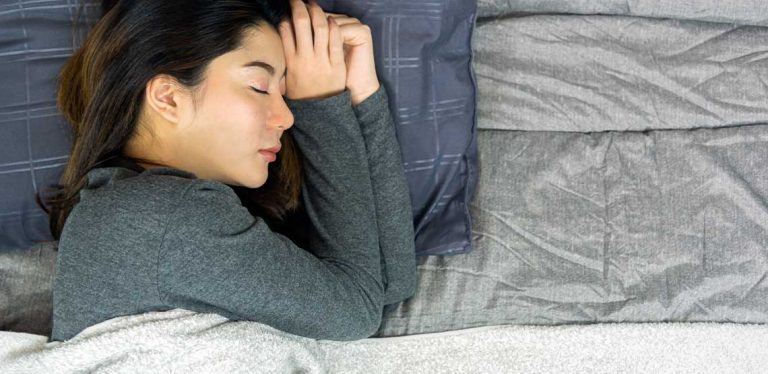How to Sleep Better at Night Naturally
While it can be difficult to get a good night's sleep, different products have been to know to help people rest easy. Having a good, comfortable mattress is key, as well as regulating your body temperature so you stay cozy while resting. Having problems sleeping is incredibly frustrating and often leads to other additional problems down the road. Here’s how to sleep better at night naturally.
How Can I Improve My Sleep?
There are several different techniques to try to get a good night's sleep. Consider the following tips for a better night sleep:
- Create a comfortable environment: In order to sleep well, you need to be comfortable. Some people can fall asleep in a busy vehicle, while others need to "set the scene". Having a good mattress and comfortable bedding is a great way to encourage sleep. Another thing to consider is darkening rooms, reducing noise, and cutting out screen time. Consider black-out curtains, earplugs, masks, and keeping electronics out of your room.
- Be physically active: Exercising regularly is linked with several benefits. One such benefit is that those who exercise regularly have better sleep schedules. Having a good exercise routine is good for everyone whether or not you have sleeping problems.
- Work out of your bed: This also means your laptop should be nowhere near your bed. While some living situations make it impossible to surf the web elsewhere, try to set up a workspace that is not in your room. When you work, watch TV, or play games in your bed, your mind associates your room with so much more than sleeping. You want to take extra steps to make sure your brain knows walking into your room means it is time to sleep.
- Cut out stimulants: Another way to let your body know that it should sleep is to cut stimulants out of your routine. Caffeine and nicotine are two huge culprits of restless nights because they are chemicals meant to keep you awake. While a cup of coffee is a great way to get focused in the morning, consider cutting it out of your diet when you are struggling to sleep. Although not a stimulant, alcohol is another substance that may interfere with your sleep.
- Keep a schedule: Waking up (and going to bed) at the same time every day is ideal for getting a good night's rest. This means you should continue to maintain this schedule throughout vacations and weekends.
- Manage mental health: Above all, many sleeping problems stem from mental health problems. Reducing stress and learning how to control intrusive thoughts is a great way to help with sleeping problems. Consider seeking therapy to learn more about how to manage your mental health.
Related Search Topics (Ads)
Understanding Sleep Disorders
Sleep is an important part of our overall health. However, sleep disorders can affect anyone, resulting in various negative effects on physical, mental and emotional health. Sleep disorders are a group of medical conditions that disrupt the normal sleep pattern, leading to problems falling asleep, staying asleep or waking up too early. Some of the most common sleep disorders include excessive daytime sleepiness (EDS), narcolepsy and sleep apnea. These conditions can be treated with various medications such as Modafinil, Armodafinil and Solriamfetol.
Excessive daytime sleepiness (EDS) is a condition characterized by a persistent feeling of sleepiness during the day, even after adequate nighttime sleep. EDS can be caused by various factors, including sleep deprivation, medication side effects and underlying medical conditions. Individuals with EDS may find it difficult to concentrate, stay alert or remain awake during the day, which can lead to impaired performance at work or school and increase the risk of accidents while driving.
Narcolepsy is a chronic sleep disorder that affects the brain's ability to regulate the sleep-wake cycle. Individuals with narcolepsy experience excessive daytime sleepiness, sudden attacks of sleep and vivid hallucinations upon falling asleep or waking up. Narcolepsy is caused by a deficiency of a brain chemical called hypocretin, which plays a vital role in regulating wakefulness and sleep.
Sleep apnea is a common sleep disorder characterized by episodes of interrupted breathing during sleep, leading to reduced oxygen flow to the body and brain. Sleep apnea is caused by a narrowing or blocking of the airway, which can result in loud snoring, gasping or choking during sleep. Sleep apnea can lead to fragmented sleep, daytime sleepiness and various health problems, including high blood pressure, heart disease and stroke.
Is a Good Night's Sleep Really Important?
Sleep is necessary for everyone. Our bodies need time to recharge. While some people need less sleep than others to function, virtually everyone eventually needs to sleep. Without sleep, you will suffer a mental and physical toll.
Heightened irritability, decreased mental capacity, and headaches are just a few symptoms of lack of sleep. The longer you go without sleep, the more severe the symptoms progress. Continuous lack of sleep is also correlated with several different long-term problems. It has been linked to many chronic conditions, including obesity, depression, and diabetes.
Although you should not panic about your health if you have missed a few nights of good sleep, itis wise to aim to get the necessary amount of sleep regularly.
How Much Sleep is Healthy?
At different stages in our lives, our bodies require different amounts of sleep. While children need a little more, the average adult needs somewhere between seven and eight hours of sleep. This number will vary between individuals as some people do not need as much or may require a little more to function properly.
When Should I See a Doctor?
If you are suffering from a consistent inability to sleep despite trying natural remedies, it may be time to talk to a doctor. A trained physician can offer expert advice on your sleeping problem. They may recommend running tests to investigate any possible underlying medical conditions.
While there are medications that can effectively help with sleep, this ideally should not be your first response. Many pharmaceutical sleep aids have addictive properties and are not suitable for the long run. Your doctor can offer potential treatment options and clarity on any potential risks.

